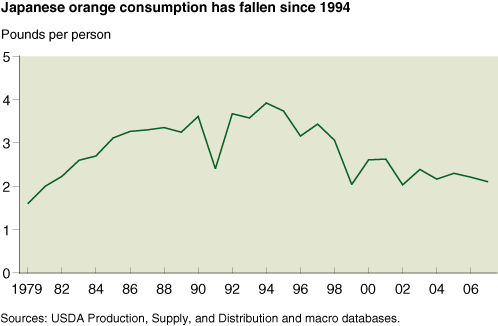Why Has Japan’s Orange Market Declined?
- by John Dyck and Susan Pollack
- 4/1/2008
Japan was once the largest foreign market for U.S. oranges, but since the mid-1990s, orange consumption and imports in Japan have fallen by over 30 percent. The United States is still the source of most of Japan’s oranges, but Japan has fallen to third place among U.S. export destinations.
Although income and price changes are often important determinants of consumption, they do not explain Japan’s falling orange consumption. Recent ERS research shows that orange consumption in Japan is sensitive to price changes, but Japan’s prices have not changed much since the mid-1990s. In addition, orange consumption in Japan is not sensitive to income changes. In any case, household incomes have been flat in real terms.
Japan’s steadily changing demographics over the past 15 years have affected orange consumption. The population is aging, and the number of births is so low that Japan’s population is gradually declining. The Japanese tend to eat more oranges as they age, which has helped boost orange consumption. However, Japan’s oldest generations (born before World War II) have shown considerably greater preference for oranges than cohorts born in more recent decades. Thus, aging has cut two ways: most Japanese, regardless of when they were born, eat more oranges as they get older; however, the Japanese who were born earlier in the 20th century eat a lot more oranges, and consumption falls as this older generation dies off.
But even changing population patterns do not explain entirely the recent fall in orange consumption. The net effect of population change appears to have been neutral since the mid-1990s. After population, price, and income changes are taken into account, much of the negative trend in orange consumption per person remains unexplained. The same phenomenon also affects fresh fruit consumption in general in Japan. Some observers have suggested that factors related to eating convenience may be important, but this idea has not yet been tested.
The decline in Japan’s orange market could accelerate as the generational shift in taste for oranges becomes more pronounced. This presents a challenge to U.S. orange growers, who have long valued the Japanese market. Since Japanese consumers are likely to increase consumption if prices decline, lower tariffs on imports and lower marketing margins in Japan would be in the interest of U.S. exports.
This article is drawn from:
- The Japanese Market for Oranges. (2008). USDA, Economic Research Service.


